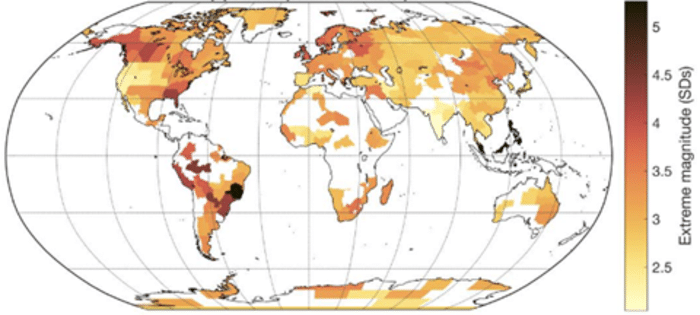A new study shows that Peru and Alaska, among other countries, have experienced periods when the weather has been warmer than average in recent decades.
Where and when did the most intense heat waves occur since 1960? That’s what Vicki Thompson of the University of Bristol and colleagues have achieved. They came up with an eight-piece list – which includes a number of relatively unknown heat waves. Meanwhile, a number of well-known figures are missing, such as those in Europe in 2003 and 2019. How about that?
39.5 degrees in Canada
It is important to note that the hypothesis of the study by Thompson and colleagues was not “Where was the highest temperature?” , but “Where was the temperature much higher than normal in the area in question?” Then, for example, the heat wave that swept North America last year is very intense. In the region in question, the average maximum temperature on the day was 39.5 degrees Celsius, while the average temperature in the ten years prior to those three hottest months was only 23.4 degrees.
Thompson and her team found seven more instances of “extreme temperatures” in the data: in Canada (1969), the southeastern United States (1980), southern Brazil (1985), Southeast Asia (1998), southwestern Peru (2016), southern Alaska (2019) and Southeast Brazil (2020).
Outliers gone
One cannot help but wonder if these are really the heat waves with the greatest impact on people, says Peter Sigmund. He is associated with the KNMI as a climate expert and was not involved in the study. “I tend to think: If the average temperature is normally 20 degrees somewhere and then 25 degrees for a while, that wouldn’t really be a problem. But if you go from 35 to 40 degrees, it is. Look at India. Weather It’s warm there every year, but the current heat wave is very dangerous.”
Another point is that Thompson and his colleagues cover fairly large areas. As a result, local outliers disappear from the image. For example, during the North American heat wave of 2021, a maximum temperature of nearly 50 degrees was measured. But the average temperature for the entire region used in the new study is more than 10 degrees lower.
biggest killers
Also remarkable is the presence of very few white spots on the map with the study. This is the result of the fact that the researchers used not one, but two sets of observational data. If they disagreed about a particular area, they omitted this finding.

This map shows the most intense heat wave for each region: the darker the color, the more it deviates from the mean. Illustration: University of Bristol
“On the other hand, it’s very good to use two sets of data,” says Sigmund. “On the other hand, it is unfortunate that a number of areas where it is very hot have been left out.”
However, he describes it as a good and well-researched study, which rightly draws attention to heat waves. “Heat waves are the biggest cause of weather phenomena. Hurricanes cause the most damage, but heat waves cause the most deaths.”
positive side
There is also a positive side to studying. Yes, the average temperature on Earth is rising and this also has consequences for heat waves. In their article, Thompson and his colleagues write about the changes you see with heat waves science progress“with the same magnitude as changes in average temperature”.
“This is surprising,” says Sigmund. “In the Netherlands, we see that extreme temperatures are rising faster than the annual average. But these researchers do not think so for the whole world; nor in their projections for the future.”
worst prepared
Finally, the authors issued warnings towards areas where, by their definition, heat waves did not occur, such as parts of India, Australia, and Central Africa. “These regions may be less prepared for higher temperatures because they did not have to adapt to it sooner.” While on average they have to deal with a heat wave once every thirty years. Looks like they’ve been lucky so far.
Sigmund thinks it’s a logical point. Countries should not think that they will never have to deal with heat waves. If you haven’t been sick for five years, that doesn’t mean it guarantees you’ll stay healthy the next year.”

Zombie specialist. Friendly twitter guru. Internet buff. Organizer. Coffee trailblazer. Lifelong problem solver. Certified travel enthusiast. Alcohol geek.

